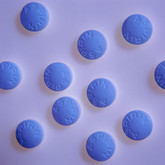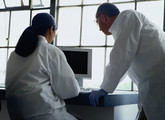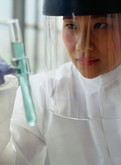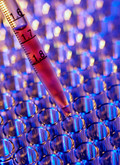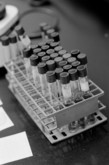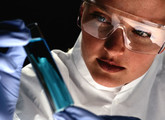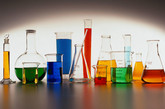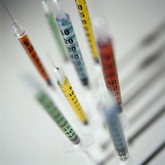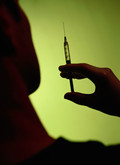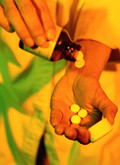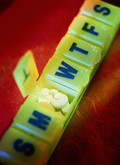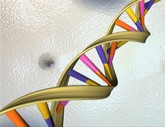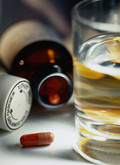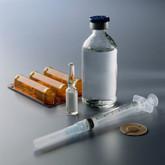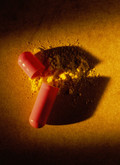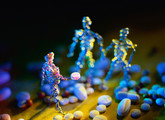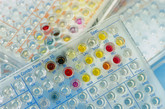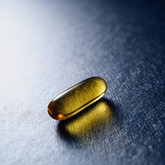Biosimilars/Research
Medicines spending in Brazil
The Brazilian pharmaceutical market is the third largest in the Americas region, behind the US and Canada; it ranks first in the Latin American region. Pharmaceutical demand will continue to rise, fuelled by increasing disposable income. Despite this positive outlook, the trade deficit in Brazil grew from US$700 million at the end of the 1980s to a cumulative US$7.13 billion in 2008. In 2008 alone, Brazil imported US$1.4 billion in vaccines, serum and blood products, while exporting US$37 million in medicinal products with low added value [1].
Biologicals boom
Researchers predict that the present list of top 10 blockbuster drugs will change dramatically by 2014. The predictions are that by 2014 biological drugs will topple the present market leaders Pfizer’s Lipitor (atorvastatin) and Sanofi’s Plavix (clopidogrel), both of which are small molecule chemical entities [1].
Mobilization of stem cells in healthy donors by G-CSF biosimilars shows comparable efficacy and safety to Neupogen
Originator human recombinant granulocyte colony-stimulating factor (G-CSF) filgrastim has been widely used for the mobilization of CD34+ stem cells in healthy donors. However, there is limited experience with the use of biosimilar G-CSF for the mobilization of peripheral blood stem cells (PBSCs), especially in healthy donors. A recent study by Professor Schmitt and co-authors has addressed this issue and found that biosimilar G-CSF showed comparable efficacy and safety with reference G-CSF (Neupogen) when used for the mobilization of CD34+ stem cells, as well as CD3+ T-cells and nucleated cells, in healthy donors [1].
Overview of research on G-CSF biosimilars in 2012
Period: January to August 2012
A life-threatening complication for patients undergoing chemotherapy is febrile neutropenia, involving a loss of neutrophils (white blood cells) and fever [1]. Granulocyte colony-stimulating factors (G-CSFs) are growth factors, which stimulate the bone marrow to produce white blood cells and restore neutrophil production. In oncology and haematology, G-CSF is used with certain cancer patients to accelerate recovery from neutropenia after chemotherapy, allowing higher-intensity treatment regimens.
Positive phase I data for infliximab biosimilar
US-based Epirus Biopharmaceuticals (Epirus) announced on 4 January 2013 that its biosimilar infliximab candidate had ‘achieved bioequivalence’ to Remicade (infliximab) in a single dose comparator trial.
Overview of research on analytical techniques in the manufacturing of biosimilars in 2012
Period: January to August 2012
Biologicals are large, complex and heterogeneous proteins with variable molecular weights, typically ranging from 18,000 to 45,000 Da. The active substance of a biological is a collection of large protein isoforms and not a single molecular entity. This fact makes manufacturing of biosimilars much more of a challenge than when producing traditional small molecule generics. It also makes it highly unlikely that the active substances between two products are identical and makes it extremely difficult to establish biopharmaceutical equivalence using analytical techniques.
Biosimilar monoclonal antibodies on the horizon in Europe
European Medicines Agency's (EMA) Committee for Medicinal Products for Human Use adopted the final guideline on biosimilar monoclonal antibody (mAb) and it came into effect in December 2012. The agency is also currently reviewing two marketing authorization applications (MAAs) for the biosimilar mAb infliximab.
Significance of locally produced biosimilars in Iran
Biopharmaceuticals, drugs produced by live cell culture, have a fast growing market for the treatment of a range of conditions. Despite their clinical importance, however, their cost could impose an increasing burden on either national healthcare systems or patients’ out-of-pocket expenses. The potential for reducing the costs of biopharmaceuticals is therefore attracting the attention of policymakers in the health sector.
History of biosimilar monoclonal antibodies regulation in EU
Monoclonal antibodies (mAbs) are high molecular weight proteins (~150 kDa), with highly complex secondary and tertiary structures, subject to post-translational modifications, such as glycosylation.
Overview of research on manufacturing statistics and innovations of biosimilars in 2012
Period: January to August 2012
Manufacturing of biosimilars is much more challenging than producing traditional small molecule generics. Reasons for this include, in the first place, the huge costs associated with manufacturing of biosimilars, along with the fact that the risk of failure for biosimilars is significantly higher than that for small molecule generics. Secondly, biosimilars are larger and more complex molecules to manufacture. Finally, minor changes in the manufacturing process can cause significant changes in efficacy or immunogenicity.
Comparison of EPARs for G-CSF biosimilars approved in Europe
EMA approved its first biosimilar granulocyte colony-stimulating factor (G-CSF, filgrastim) for use in Europe back in 2008, since then, several biosimilar G-CSFs have been approved, including Biograstim, Filgrastim ratiopharm, Ratiograstim, Tevagrastim, Filgrastim Hexal, Zarzio and Nivestim. All biosimilar G-CSFs were approved using Amgen’s Neupogen as the reference product. Filgrastim ratiopharm was withdrawn on 20 April 2011.
Overview of research on regulatory issues surrounding biosimilars in 2012
Period: January to August 2012
In the area of regulation of biosimilars Europe has by far the best-established framework for approval and EMA has already issued both general and product specific guidelines for biosimilar applications to the EU [1]. The first biosimilar was approved in the EU in 2006 for Omnitrope (somatropin). There are now 14 biosimilars approved for use in Europe for three reference products: erythropoietin, granulocyte-colony stimulating factor and somatropin [2].
Overview of research on US regulatory issues surrounding biosimilars in 2012
Period: January to August 2012
The US is somewhat behind Europe in the biosimilars race, but has issued draft guidance and is expected to have a practical biosimilar approval pathway in place in the near future.
Dialogue needed to build confidence in biosimilars
Concerns about the safety and efficacy of biosimilars have led many healthcare professionals to become reluctant to prescribe these products for their patients [1]. According to a commentary by Dr Hans C Ebbers and co-authors, these concerns could be addressed through more engagements taking place between regulatory authorities and the medical community over the drafting of regulatory guidelines [2]. This would result in greater confidence in the regulatory process and trust in the products that gain approval.
Positive results from phase III study with biosimilar human insulin
One of Asia’s leading biotechnology companies, Biocon, announced on 31 October 2012 positive results from its global phase III study for its recombinant human insulin (Insugen). The study, which was carried out in type 1 diabetes mellitus (T1DM) patients, demonstrated comparable safety and efficacy compared to the originator product.
Sandoz starts phase III US trial for biosimilar epoetin alfa
Sandoz, the generic drug division of Swiss drug giant Novartis, announced on 25 October 2012 that it had started patient enrolment in a phase III clinical trial in the US for biosimilar epoetin alfa (Amgen/Johnson & Johnson’s Epogen/Procrit).
Pfizer carrying out biosimilar trastuzumab trial in US
Pharma giant Pfizer is carrying out a phase I trial in the US for a biosimilar version of trastuzumab.
Overview of research on biosimilarity/comparability and interchangeability of biosimilars 2012
Period: January to August 2012
After the patent on a biological medicine expires ‘similar’ versions of the originator biological can be produced. These biosimilars or ‘similar biological medicinal products’ are similar (but not identical) in terms of quality, safety and efficacy to an authorised reference biological medicine.
Boehringer Ingelheim completes biosimilar adalimumab trial
Biopharmaceutical specialist Boehringer Ingelheim Pharmaceuticals (Boehringer Ingelheim) has completed its phase I trial for a biosimilar version of adalimumab.
Overview of research on safety and immunogenicity of biosimilars in 2012
Period: January to August 2012
Biosimilars or ‘biosimilar medicinal products’ are medicinal products that are similar (but not identical) in terms of quality, safety and efficacy to an authorised biological reference medicine. Manufacturing of biologicals is complex, and the quality of the resulting biological is dependent on careful control of manufacturing processes and conditions. Unlike traditional small molecule (chemical) drugs, the development of biologicals is different and variable with respect to the manufacturing process and environmental factors, such as light and temperature. The complexity and heterogeneity of the molecular structure, complicated manufacturing processes, different analytical methods and possibility of immunogenicity reactions make quantitative evaluation of biosimilars a challenge to both the scientific community and regulatory agencies.
